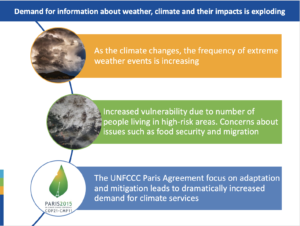The World Meteorological Congress has approved three initiatives to strengthen the world’s exchange of observational data from across the globe to improve weather and climate services.
The three initiatives are the WMO Unified Data Policy, the Global Basic Observing Network, and the Systematic Observations Financing Facility. The WMO’s actions have been taken due to the data gaps in data-sparse regions and lack of sustainable financing; transformative changes in data, science, and technology; and the rapid growth of private-sector capabilities and activities in meteorology.
WMO Unified Data Policy

The WMO Unified Data Policy will guide the international exchange of weather, climate and related Earth system data between the 193 member states and territories of WMO. It will encompass all WMO-relevant Earth system data – weather, climate, hydrology, ocean, atmospheric composition, cryosphere, and space weather. This guidance is designed to enable all WMO members to deliver better, more accurate and more timely weather and climate-related services. The policy is built around a modular approach that allows for incremental updates in the decades ahead. This Earth-system approach is designed to create socioeconomic benefits for the global community by strengthening all Earth system monitoring and prediction.
Global Basic Observing Network
As members are increasingly depending on model data products, the Global Basic Observing Network (GBON) represents a new approach in which the basic surface-based observing network needed to feed the numerical weather prediction (NWP) models with input data is monitored at the global level. Once fully implemented, GBON will increase the availability of the most essential surface-based data. This is intended to improve the quality of weather forecasts and thus help to improve global public safety and well-being. To reach this goal, additional investment and capacity development will be needed for many developing countries. WMO is working with the international development and climate finance communities to facilitate this. According to an analysis undertaken jointly by the World Bank, WMO and the Met Office (UK), for every dollar invested at least US$26 in socioeconomic return could be realized.
Systematic Observations Financing Facility
The Systematic Observations Financing Facility (SOFF) is to support developing countries struggling to provide enough observational data for weather and climate services, especially in Africa and Small Island Developing States. SOFF will provide long-term grants and technical assistance, with a focus on these areas to enable sustained compliance with GBON regulations.
SOFF will deploy a global approach with sustained international data exchange as a measure of success. The initiative will work to enhance technical competency through peer-to-peer advisory, harnessing the operational experience of the more advanced national meteorological services around the globe.
SOFF is being established under the leadership of WMO, the UN Development Programme (UNDP) and the UN Environment Programme (UNEP), and partners in the Alliance for Hydromet Development. The creation of SOFF will be announced at the forthcoming UN Climate Change negotiations, COP26, and is envisaged to become operational by mid-2022.
World Meteorological Organization (WMO) secretary-general Prof. Petteri Taalas, said, “The global nature of the climate system means that successful weather and climate services are completely dependent upon continued access to observational data from around the globe, exchanged internationally. With extreme weather events becoming more frequent, the growing vulnerability of people living in high-risk areas, and concerns about food security, are contributing to a huge increase in demand for information about weather, climate and water and their impacts. Today, our 193 members together have ensured that these services will have access to enough of this vital data to meet the challenges of the 21st century.”



